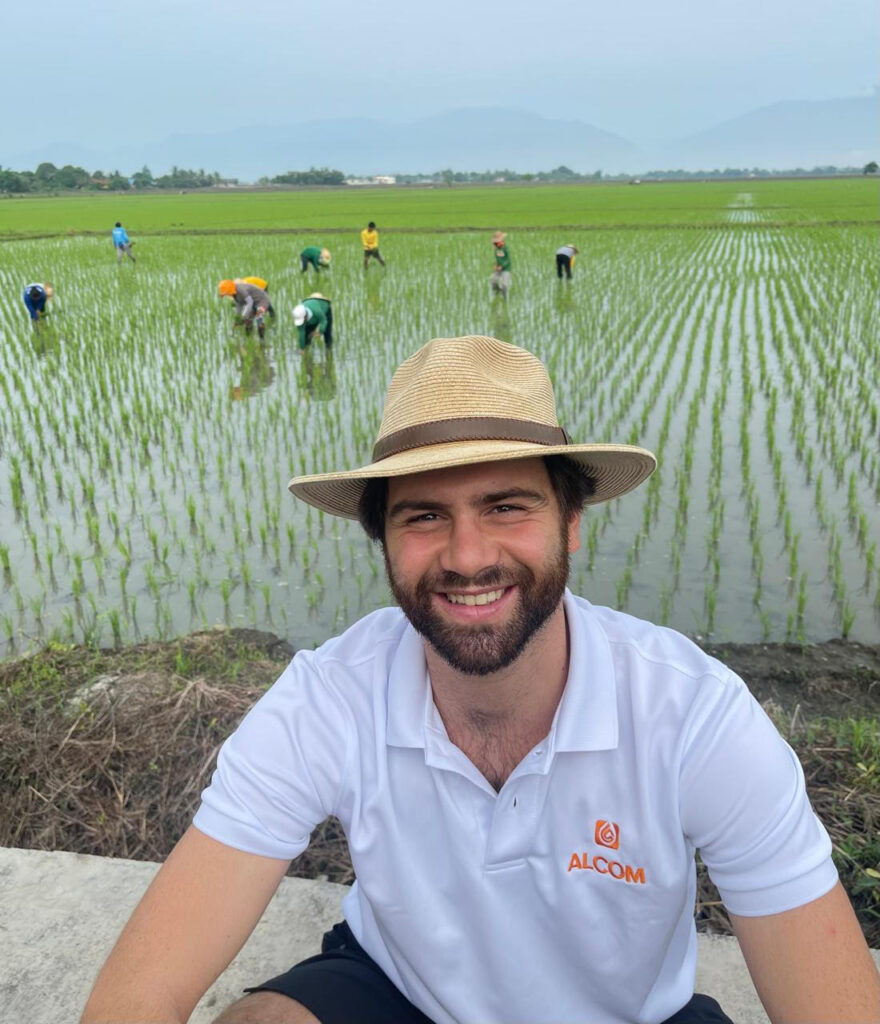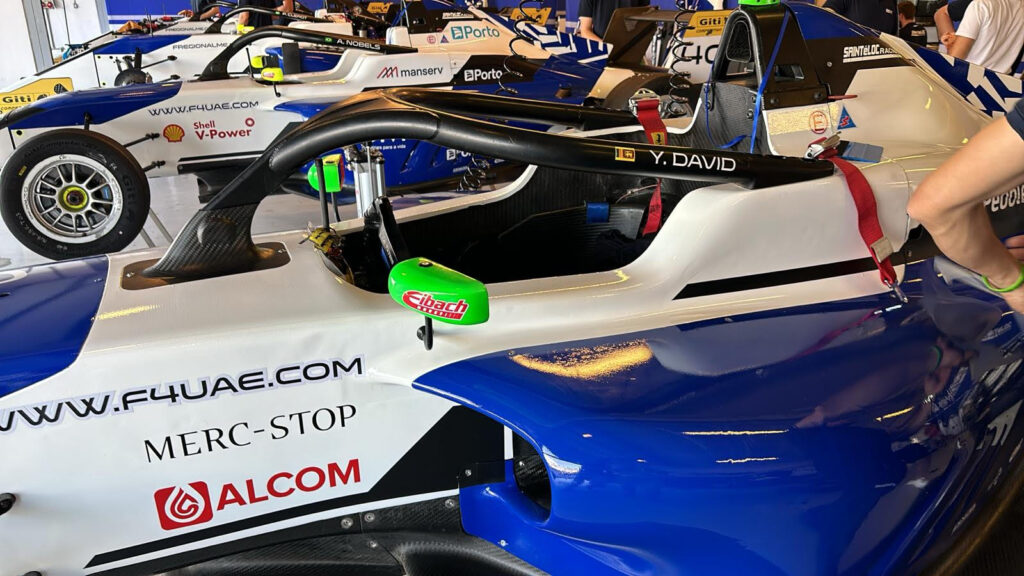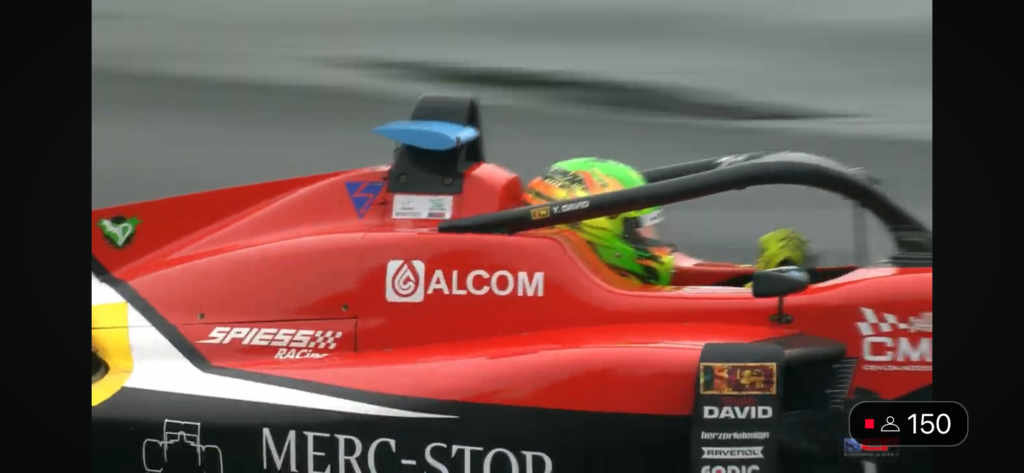Alcom (Headquarters: Singapore) Alcom is a Singapore-based Renewable Energy and Climate Tech company where it focuses on two core business verticals – Biofuels & Carbon Removals (CDR) Projects.
In the biofuels space, waste is collected and pre-processed, such as used cooking oil, and supplied for conversion into biomarine fuels (BMF), sustainable aviation fuel (SAF), and other low-carbon biofuels. Alcom operates pre-treatment facilities and establishes long-term contracts with suppliers to ensure these discarded oils are converted into biofuels, such as Bio Marine fuels(BMF) and Sustainable Aviation Fuel (SAF). Ultimately, Alcom collects the finished products and supplies them to end-users, such as shipping companies and airlines, through its distribution network.
We interviewed Mr. PRATEEK TIWARI, the founder and CEO of Alcom, about the current state of the company and its future outlook.
(Text by Hirofumi Yamamoto)
Photo courtesy=Alcom, Hirofumi Yamamoto,

The company also has been tackling Carbon removals space (CDR) it is involved in developing carbon removal projects CHP/BioChar using inhouse pyrolysis technology, developing carbon credits methodologies in collaboration with international registries like Gold Standard, carrying out Life Cycle assessments (LCA) and developing solutions for scope 1, 2 & 3 emissions
―Could you provide an overview of Alcom?
“We are a Renewable Energy and Climate Technology company headquartered in Singapore. While we launched in January 2020, the background of our team spans over 20 years, covering areas such as international shipping, biofuel processing, trading and developing Carbon Removals solutions. Our operations are spread across various locations, including the UK, the US, Singapore, the Philippines, and China, and our team brings experience from these diverse regions.”
“For example, one of our team members was previously the head of the chartering division at Exxon, managing Very Large Crude Carriers (VLCCs) and Ultra Large Crude Carriers (ULCCs). He also has extensive experience in biofuel supply chain. As for myself, I started my career at EDF Man in London as a Commodities Trader and later joined Bunge, a major agricultural firm listed on the New York Stock Exchange, which was a leading biofuel producer at the time. Bunge now operates a joint venture with BP (British Petroleum).”
“After that, I transitioned to the oil and gas sector, working with Vitol and Trafigura. From 2014 to 2019, I led Vitol’s biofuel division in Singapore as Trading Manager, after which I spent a short time at Trafigura. I have accumulated experience across both the agricultural and shipping sectors, as well as the oil and gas industries. In 2020, I founded Alcom.”
―What was the motivation behind founding Alcom?
“The purpose of founding Alcom was to identify challenges and gaps in decarbonization and provide solutions to address them. We focus particularly on decarbonization in the maritime, aviation and agricultural sectors. These industries are considered ‘hard-to-abate’ areas, meaning that decarbonization is particularly difficult. Decarbonizing these sectors presents significant challenges but tremendous opportunities as well.”
―Are you saying that agriculture and shipping are connected through the use of biofuels?
“Yes, exactly. The agricultural sector produces biofuels, and the maritime sector consumes them. For instance, agriculture accounts for 7-10% of global greenhouse gas emissions, with rice production being a major contributor. During rice cultivation, fields are flooded, which can create small bubbles of methane gas on the water’s surface. This process constantly releases methane, a highly harmful greenhouse gas. Moreover, significant amounts of fossil fuels are consumed by agricultural machinery and during the milling process, further increasing carbon emissions.”
“We collect agricultural waste from farms and rice mills, and we are involved in end-to-end project development. As project developers, we possess both the technology and the expertise to handle everything in-house. Agricultural waste is collected and processed into green electricity. Additionally, we generate biochar, which can be used as fertilizer. However, what is more important is biochar’s ability to remove carbon from the atmosphere. When applied to the soil, it can remain buried for thousands of years, sequestering carbon effectively—this is what we call carbon removal.”
“By recovering agricultural waste, such as rice husks and straw, we avoid burning it and instead convert it into power and biochar. Beyond serving as fertilizer, biochar acts as a tool for carbon sequestration by trapping carbon in the soil for millennia, contributing to long-term carbon removal.”
“Furthermore, we produce bio-oil, which serves as a feedstock for biofuels, eventually used as fuel in the maritime sector. Agriculture and shipping, therefore, are deeply interconnected, forming a sustainable cycle. At Alcom, our goal is to contribute to decarbonization by providing innovative technologies and solutions in these ‘hard-to-abate’ sectors—agriculture and shipping.”

■ The Price of Biofuels is High
—It is often pointed out that biofuels are more expensive than other fuels in the maritime market.
“I began trading biofuels in London around 2003 or 2004. The biggest challenge has always been the price. Why did we need to blend biofuels at a premium of $200 to $300 above conventional fuels? This question has persisted over the years. There were two main challenges. First, maritime companies and fuel traders dealing with conventional fossil fuels were initially apprehensive about the new technology and whether it would be compatible. However, I want to commend the maritime industry, as they have finally recognized over the years that the use of biofuels is technically feasible and safe. This is a significant step forward. Although it doesn’t get much attention, this shift over the past 15 to 20 years is something we should appreciate.”
“Today, stakeholders in the maritime industry worldwide, including in Japan, are exploring new fuels—such as ammonia, methanol, and liquefied natural gas (LNG)—to reduce carbon emissions. At the same time, there is also growing interest in biofuels, specifically those made from agricultural waste.”
—The waste you refer to includes materials like rice straw, correct?
“Exactly. Other materials and products can also be blended into biofuels. One example of what we do at Alcom is collecting used cooking oil, processing it into a final product, and supplying it to major oil companies and maritime firms. These companies use it as part of their decarbonization efforts, but we acknowledge that the supply is limited. Used cooking oil is also utilized in producing sustainable aviation fuel (SAF) and for naphtha production via the HVO route.’
―What is Alcom’s Business Strategy?
“Our company has two core focuses. One is biofuels for the maritime and aviation industry, and the other is decarbonization in agriculture. We conduct research and development (R&D) with team members across the globe and maintain offices in the UK, the US, Singapore, and India. Our manufacturing is based in India, and we have projects running in the Philippines. This integrated approach allows us to offer solutions that span from agricultural activities to the maritime sector.”
“We generate electricity using agricultural waste and produce bio-oil and biochar. Bio-oil serves as a feedstock for biofuels, and through further R&D, we have also succeeded in extracting hydrogen from agricultural biomass. This hydrogen can be used as green hydrogen or converted into methanol. Through green methanol, we can produce ethanol, which can ultimately be used as sustainable aviation fuel (SAF).”

■ Gold Standard
—We’ve heard that you are currently collaborating with Gold Standard. Could you explain what Gold Standard is?
“Gold Standard is one of the two or three major international organizations that provide standards for carbon projects. Several similar organizations offer these kinds of certifications, but Gold Standard is a globally recognized body for verifying and registering carbon projects. Only projects that meet their strict criteria are allowed to generate carbon credits, which can then be traded freely in international markets. The carbon market is divided into two categories: compliance markets and voluntary markets. Compliance markets include mechanisms like Japan’s Joint Crediting Mechanism (JCM) and J-Credits. On the other hand, the voluntary carbon market (VCM) allows organizations to participate voluntarily.”
“The methodology we developed in partnership with Gold Standard has been under joint development for the past two and a half to three years. These credits are CORSIA Eligible and we are the advocates of this methodology, and Gold Standard has approved it as a globally applicable standard. This allows shipping companies using biofuels voluntarily to generate high-quality carbon credits, which can then be freely traded internationally.”
“Gold Standard is a global organization with offices in locations like the U.S., Europe and in Asia. They act as a rigorous oversight body, functioning like a global watchdog for the carbon market. Gold Standard is one of the two major registries, and project developers must submit their projects for verification. If no existing methodology is available, developers work with Gold Standard to create one, enabling the generation of carbon credits. Once a project is certified by Gold Standard or another recognized certification body, such as Verra, it becomes highly credible and recognized globally.”

■ EU ETS
—As you know, the European Union Emissions Trading System (EU ETS) was launched this year for the maritime sector, requiring shipping companies to pay for their carbon emissions. How does this system relate to your work, and what are the key differences?
“EU ETS is a government-led carbon trading scheme that now includes the maritime sector. This is a positive development. However, let’s consider the challenges we’ve been dealing with. For the past 20 to 25 years, whenever I proposed biofuels to shipping companies or fuel traders, they always responded with the same concern: ‘The cost is too high.'”
“They would ask, ‘Why should we pay even $5 more per ton?’ The shipping industry is fiercely competitive, and profit margins are incredibly thin, meaning shipowners cannot afford additional costs. Even if they have the funds, they risk losing business to competitors offering cheaper fuel. So, from a business standpoint, paying a higher price simply doesn’t make sense.”
“Our solution has been to recover the green premium—the additional cost of biofuels—through carbon credits. By generating carbon credits certified by Gold Standard (CORSIA Eligible) when biofuels are used, shipping companies can trade these credits freely to cover the green premium.”
“Even shipping companies not participating in EU ETS or similar systems like Japan’s ETS can still generate carbon credits by using biofuels. These CORSIA Eligible credits, certified by Gold Standard, can offset their carbon footprint, be sold to other companies, or traded with organizations struggling with Scope 3 emissions (indirect emissions).”
—How exactly do you bridge the price gap between biofuels and conventional fuels? This seems to be a crucial point. You mentioned carbon credits earlier, and you said that shipping companies could adjust costs globally using these credits.
“That’s correct. Let me give you an example—without naming specific companies—of how container shipping companies can manage this. It’s relatively straightforward for them to purchase biofuels, even in small amounts, because they can pass the additional cost on to their customers. For instance, a container shipping company might say: ‘You are Mercedes-Benz, and I’ll transport your cars wherever you need, but I will use biofuels. Instead of $100 per container, I’ll charge you $150 because I’m using green fuel, which is good for your public relations.’ Mercedes-Benz might respond, ‘We’re willing to pay the extra $50.’ A company with strong retail power like Mercedes-Benz can easily add just $1 to the price of each car, and it wouldn’t cause any significant issues.”
“However, for operators like tankers or bulk carriers, the challenge remains significant. In these sectors, profit margins are so slim that even a profit of 10 cents per ton is meaningful. Paying $200 to $300 more for biofuels or alternative fuels like ammonia is extremely difficult.”

“Our focus is to make it possible for these companies to use low-carbon biofuels and recover the green premium through carbon credits. These credits, certified by Gold Standard, can be traded internationally, encouraging the adoption of low-carbon fuels within the maritime sector.”
― What Carbon Market is Alcom Targeting?
“We are aiming for growth in the voluntary carbon market with a view that eventually Voluntary and mandatory markets will converge. For instance, regulated markets like those in the EU and Japan will see the introduction of ‘FuelEU’ on January 1, 2025. Industry players are already discussing how to comply with this new regulation.”
“However, some shipowners and stakeholders are actively seeking loopholes. They are considering strategies like pooling five companies together or forming groups of 20 to meet the requirements. This approach undermines the original purpose. We must not forget why we are pursuing decarbonization in the first place. If it becomes merely a compliance issue, the real commitment to decarbonization is lost. True solutions require meaningful action, not finding loopholes.”
“Our focus is on enabling companies to generate and trade carbon credits globally by using low-carbon fuels, taking FuelEU into consideration. For example, using biofuels in the Port of Rotterdam grants ‘house blending credits,’ but not all governments worldwide can afford to support such initiatives. This creates a disparity—credits are available in some countries but not in others.”
“The EU has imposed strict regulations, including the inclusion of shipping in the Emissions Trading System (ETS). However, in Asia, Africa, Latin America, and even the United States, there are very few incentives for blending biofuels. People ask, ‘Why should we blend fuels at all?’ Our solution is to offer high-quality carbon credits certified by Gold Standard to offset the green premium. This provides a financial incentive to blend low-carbon fuels.”
“These credits serve as proof when engaging with international oil trading companies, allowing us to say, ‘We are using green fuels, and these carbon credits verify that.’ The value of these credits is not determined by us but by trading platforms like CIX (Carbon Intelligence Exchange) by auctioning these credits in the market ensurining full transparency.”
―Have You Engaged with the Singapore Government and Shipping Companies?
“We are working closely with the Singapore government and shipping companies, as Singapore is one of our key hubs. Singapore is the world’s largest bunkering hub, with around 50 million tons of marine fuel consumed annually. If this were to shift to B24 (24% biofuel blend) or B30 (30% blend), it could lead to the production of 10 million tons of B24 fuel annually.”
“The IMO (International Maritime Organization) previously limited FAME (Fatty Acid Methyl Esters) content to 24%, but technically, the blend ratio can now reach up to 30%. Some shipowners have even experimented with using blends as high as 100%, taking on the associated risks themselves.”

―How Does Alcom Approach Key Markets Like Singapore and Japan?
“We don’t want this to be just a marketing tactic. We aim for more than short-term attention from container companies using biofuels temporarily. Large chemical carriers, crude oil tankers, grain carriers, and bulk carriers should also actively adopt low-carbon biofuels and maritime fuels. This is the way to achieve real decarbonization.”
“For example, Singapore handles around 50 million tons of bunker fuel annually, with container and passenger ships accounting for only 20-25% of that. The majority of this volume comes from large tankers transporting crude oil, energy, grain, and bulk cargo. These shipowners cannot afford to pay an extra $300 per ton for low-carbon fuels. Therefore, our goal is to encourage as many shipowners as possible to adopt low-carbon fuel solutions.”
“Currently, as a container shipowner, they can blend biofuels and pass on the premium to my customers. However, other shipowners who cannot decarbonize may simply trade my premium. This is known as a ‘pooling approach,’ a workaround that balances pros and cons. While it is not a complete solution, it is at least a step in the right direction. But it’s merely a defensive tactic in the early stages. True decarbonization requires deeper commitment.”
“Major companies, such as Ocean Network Express (ONE) and others, are making genuine efforts to reduce CO₂ emissions to protect their corporate reputations. Unfortunately, many smaller shipping companies, particularly in Asia, show little concern about their emissions because they don’t face penalties or need to purchase carbon credits. This is a mindset issue. The maritime industry is conservative by nature, with deeply ingrained habits.”
“The three major Japanese shipping companies—NYK Line, MOL, and K-Line—operate around 800 vessels in total. About half of these are on time charter from lesser-known Japanese or Asian shipowners. Now, larger companies are starting to pressure these shipowners to reduce emissions. This could work to your advantage, as they will need to adopt biofuels and other alternative fuels.”

― Is Alcom’s Focus Limited to Biofuels?
“While our primary focus is currently on biofuels, we plan to explore other low carbon fuels such as ammonia and hydrogen in the future. This initiative is led by our Global Projects Director, Sid Kaul, based in our London(UK) office, in close collaboration with Gold Standard. We are not limiting ourselves to biofuels—we are looking at a broader range of low-carbon fuels.”
“Technically, existing engines can run on biofuels without modification. It is possible to use B24 (24% biofuel blend), B30 (30% blend), or even 100% biofuel. Ammonia and methanol require some modifications, but shipowners are already moving in that direction. For example, Maersk has placed orders with other major companies for methanol-powered vessels.”
― Who Will Pay for the Green Premium?
“The critical issue is that regardless of which low-carbon fuel is chosen, it will come at a higher cost compared to VLSFO (Very Low Sulfur Fuel Oil). If governments provide subsidies, the conversation shifts to, ‘If it costs $500 more, but the government covers it, I’ll do it.’ But without subsidies, what happens? This is the fundamental question: Who will pay for the green premium? Will it be the government, the customer, or the shipowner? If the shipowner has to bear the cost without any way to recover it, why would they pay? Without proper regulations, there’s no incentive to make that investment.”
― What Challenges Does the Maritime Industry Face Regarding Future Fuel Solutions?
“The key challenge shipowners and the maritime sector face is understanding the cost of *not* decarbonizing. What happens if shipowners don’t take action today? Their customers—the cargo owners—are under significant pressure to reduce their Scope 3 emissions (indirect emissions). If another shipowner says, ‘I use biofuels,’ the cargo owner will likely choose them, causing the non-compliant shipowner to lose business.”
― How Much Biofuel Does Alcom Currently Supply?
“In terms of biofuel supply, we have no significant shortages in Asia or globally. In Singapore, between 2021 and 2024, biofuel supplies have steadily increased. In the first year, around 40,000 to 50,000 tons of biofuel were supplied across the industry—not just by Alcom. However, this volume has now grown to around 300,000 to 400,000 tons, according to recent data. There is still immense potential in Singapore alone, theoretically allowing for up to 10 million tons of biofuel to be supplied—around 30% of the total fuel consumption.”
― Supply Constraints and Decarbonization Solutions in the Maritime Sector
“One challenge is that used cooking oil (UCO) is also in high demand for producing sustainable aviation fuel (SAF) and green naphtha. As UCO is highly valuable, we need to identify alternative raw materials. With aviation competing for these resources, it’s crucial to explore other low-carbon fuels like green ammonia, green hydrogen, and biofuels to achieve maritime decarbonization.”
“One commonly discussed issue is biofuel’s lower energy density compared to fossil fuels. It’s true that biofuels have a lower calorific value, but we account for that commercially by adjusting prices. If biofuels contain 10% less energy, we price them 10% lower. This is how the market resolves such challenges over time.”
“The maritime industry deserves credit for overcoming these hurdles. It has recognized the technical viability of biofuels, addressed energy density concerns, and made engine modifications to accommodate them. While some shipping companies remain skeptical, progress has been remarkable—especially compared to 2003 or 2004 when people dismissed biofuels as unworkable.”

― Shifting the Maritime Industry’s Perception and Driving Awareness
“Changing industry attitudes is a significant challenge. Communication between companies is essential, and discussions at conferences and events about the technical compatibility of low-carbon fuels are promising signs. The maritime industry has come a long way. When I entered the field in 2003, the idea of using biofuels was dismissed. Today, they are accepted, with challenges identified and actively addressed.”
“I’m from India, and while Japan is a developed country, many countries, including India, Indonesia, and Vietnam, still face significant economic challenges. Out of India’s 1.5 billion population, 300 to 400 million people struggle to make ends meet. Asking them to focus on decarbonization when they are struggling to eat is unrealistic. Emissions will likely continue rising in these regions.”
“This issue isn’t limited to developing countries—advanced economies like the U.S., China, and Europe still emit significant amounts of CO₂. The challenge is global, and we need continuous effort from all nations.”
― Why is the Maritime Sector Now Conducting Biofuel Trials?
“The maritime industry is trialing biofuels because, for now, other alternative fuels like green methanol, ammonia, and hydrogen are not readily available. Some companies focus on minimizing methane leakage during vessel operations and generating carbon credits, which is different from our approach. Companies like Fremco and Daphne Tech specialize in these areas.”
“Our solution is globally applicable, suitable for all maritime markets, including Japan, South Korea, and others. It aligns with initiatives from the IMO (International Maritime Organization), FuelEU Maritime, and government programs, making it a highly attractive investment for international investors.”
―What is Alcom’s Strategy for the Japanese Market?
“We plan to engage stakeholders through presentations, podcasts, webinars, and conferences. Japan is well-known for its business leaders, and we hope to use these opportunities to connect with Japanese shipowners and stakeholders. Additionally, generating carbon credits has commercial value, which makes it a compelling business proposition.”
“Journalism is facing challenges globally, with shrinking readerships. Japanese newspapers, including your company, must expand their focus from domestic business to providing international news relevant to domestic companies. Japan is a curious country, and many of its businesspeople are eager to engage with India, which is encouraging. Although language barriers exist, they also present opportunities.”
※Would you show us the Profile or Mr.Tiwari, ex graduated university, your carriers,
PRATEEK TIWARI – Founder and CEO
Alcom is a Singapore-based company with a global footprint. It focuses on developing waste agri Biomass based Carbon removals projects – (Biochar) Globally.
At the helm of Alcom is Prateek Tiwari who brings over 23 years of global work experience in Biofuels and Carbon markets. He started his career with ED&F Man in London as a commodities Trader and in the Philippines, where he set up and managed a joint venture with Shell Philippines for Biofuels and low-carbon fuels distribution. He then worked for Bunge (A NYSE company) in the UK, USA Singapore, Vitol (Singapore) , and Trafigura (Singapore).
Alcom Operates pre-treatment facilities and manages ean end-to-end supply chain in low carbon fuels space for Bio Marine Fuels (BMF) and Sustainable Aviation Fuel (SAF) production.
Through its Carbon business vertical Alcom focuses on developing carbon removal projects – CDR from agri biomass waste through its unique combined heat, power ,and Biochar technology(CHPB)
Prateek hails from India and after completing his high school from Army Public School in India, he moved to UK.
He has a Master’s Degree in Applied Economics and Specialist Master’s MSc Energy, Trade & Finance from Bayes Business School(Formerly Cass Business School), London UK.

〆Alcom、海運市場で新たなバイオ燃料の未来を開拓する。日本の海運業界にも供給目指す。
Alcom(本社・シンガポール)は、バイオ燃料のサプライチェーン管理会社である。使用済み食用油などの廃棄物を収集・前処理し、船舶燃料や持続可能な航空燃料(SAF)、その他の低炭素バイオ燃料に変換するために供給する。Alcomは廃棄物の前処理施設を運営し、供給元と長期契約を結ぶことで、これらの廃棄された油が船舶用の燃料や続可能な航空燃料(SAF)などのバイオ燃料に変換する。最終的にAlcomは完成した製品を収集し、海運会社や航空会社などの最終ユーザーに流通ネットワークを通じて供給する。「日本の海運業界にもバイオ燃料を供給したい」と語るAlcomの創業者兼CEO(最高経営責任者)のPrateek Tiwariに現状と今後の展望について聞いた。
(Hirofumi Yamamoto)
―Alcomの概要について聞きたい。
「私たちはクライメイトテクノロジー(気候技術)を扱う会社で、シンガポールを拠点としています。2020年1月ですが、チーム全体のバックグラウンドは、過去20年間にわたる国際海運、バイオ燃料の取引・加工などに関するものです。活動拠点はイギリス、アメリカ、シンガポール、フィリピン、中国などさまざまな場所に広がっており、私たちのチームはそのような経験を持ってきました」
「例えば、チームメンバーの一人は、かつてExxon(エクソン)の用船部門の責任者を務めており、大型タンカー(VLCC)や超大型タンカー(ULCC)の用船管理に携わっていました。また、バイオ燃料の加工や取引の経験も豊富です。 私自身は、ロンドンのEDF Manという会社でキャリアをスタートし、その後、Bungeという大手農業企業(ニューヨーク証券取引所に上場している大規模な農業企業で、当時はバイオ燃料の大手生産者でした)に移りました。現在、BungeはBP(British Petroleum)と合弁事業を行っています。
その後、石油・ガス業界のVitolとTrafiguraに転職し、2013年から2019年までシンガポールでVitolのバイオ燃料部門を統括しました。その後、短期間Trafiguraにも在籍しました。 私は農業部門と海運・石油・ガス部門の両方で経験を積んできましたが、2020年にAlcomを設立しました」
―Alcomを設立した目的は何か。
「Alcomを設立した目的は、脱炭素化における課題やギャップを特定し、それを埋めるためのソリューションを提供することでした。私たちは特に、海運と農業の分野での脱炭素化に力を入れています。これらの業界は「ハード・トゥ・アベート(脱炭素化が困難)」な分野とされており、これら2つの業界を脱炭素化することは非常に難しいのです」
―海運と農業はバイオ燃料を利用するという点で共通しているということですか?
「そうです。農業部門ではバイオ燃料を生産しており、海運部門ではそれを使用していたわけです。例えば、農業は世界の温室効果ガス排出量の7~10%を占めており、その中でも特に米の生産は大きな要因です。米の生産では田植え時に水を張り、その際に水面に小さな気泡(メタンガス)が発生することがあります。これは常にメタンガスを排出しており、非常に有害です。また、農機具の使用や、精米の過程でも大量の化石燃料が消費され、炭素排出量が増えています」
「私たちは、農場や精米所などの農業廃棄物をすべて回収し、一貫したプロジェクト開発を行っています。私たちはプロジェクト開発者であり、技術とチームを持ち、すべて社内で処理しています。農業廃棄物を回収し、それを処理してグリーン電力に変換しています。また、バイオチャー(Biochar)も生成しています。バイオチャーは肥料として使用できますが、より重要なのは炭素を大気中から除去することです。肥料として土壌に適用すると、何千年もの間そのまま土中に埋められ、炭素を固定することができます。つまり、炭素除去(カーボンリムーバル)です」
「私たちはこのような農業廃棄物(米の殻や稲わら)を回収し、これを焼却せずに電力やバイオチャーに変換しています。バイオチャーは肥料として使用できるだけでなく、炭素を大気中から除去し、数千年にわたって土壌に埋められることで炭素を固定(カーボン・シーケストレーション)する効果もあります」
「さらに、バイオオイルも生成し、このオイルはバイオ燃料の原料となり、最終的には海運業界で燃料として使用されます。ですから、農業と海運は実は密接に関連しており、持続可能なサイクルを形成することが可能なのです。Alcomは、このようにして脱炭素化を目指し、農業と海運という「ハード・トゥ・アベート」な分野において革新的な技術と解決策を提供していきたいと考えています」
■バイオ燃料の値段が高い。
―一般的に海運市場でバイオ燃料は他の燃料に比べ割高であるという指摘が多い。
「私がバイオ燃料の取引を始めたのは2003年か2004年のロンドンです。最大の課題は、価格が非常に高いことでした。なぜ、通常より200ドルや300ドルも高い価格で混合しなければならないのか?という疑問が常にありました。課題は2つありました。まず、従来の化石燃料を扱う海運会社や燃料トレーダーは技術に対して恐れを抱いており、その技術が適合するかどうかを心配していたのです。しかし、ここで海運業界を称賛したいのは、長年を経てようやく、技術的にバイオ燃料の使用は可能であり、問題がないと認めてくれたことです。これは大きな進歩であり、過去15~20年で起こった変化の中であまり話題にはなりませんが、私たちはこのことに感謝すべきです」
「現在、日本を含む世界中の海運業界やステークホルダーが、二酸化炭素排出量を削減するために、新しい燃料(例えばアンモニアやメタノール、液化天然ガスなど)を使用しようとしています。その一方で、バイオ燃料に焦点を当てる動きもあります。農業廃棄物を利用するということです」
―あなたが説明している廃棄物というのは例えば稲わらなどで作られたものでしょうか?
「その通りです。バイオ燃料に混合できる他の製品や原料もあります。現在、業界全体で、私たちAlcomが行っていることの一例は、使用済みの食用油を回収し、加工して完成品に変え、それを石油メジャーや海運会社に供給することです。彼らはそれを脱炭素化のために使用しますが、供給量には限りがあることを理解しています。使用済みの食用油は、SAF(持続可能な航空燃料)やインドのナフサ生産にも利用されます」
―Alcomの具体的な事業戦略は。
「私たちの会社には、2つのコアフォーカスがあります。1つは海運業界向けのバイオ燃料、もう1つは農業の脱炭素化です。私たちは、世界中のチームメンバーとR&Dを行い、イギリス、アメリカ、シンガポール、インドに拠点を持っています。製造はインドで行い、プロジェクトはフィリピンにあります。この統合アプローチにより、農業分野での活動から海運分野へのソリューションを提供しようとしています」
「農業廃棄物を利用して電力を生産し、バイオオイルやバイオチャーを生成しています。バイオオイルはバイオ燃料の原料となりますが、さらにR&Dを進めて、農業廃棄物(バイオマス)から水素を抽出することにも成功しています。この水素はグリーン水素として使用することもでき、メタノールに変換することもできます。グリーンメタノールを経由してエタノールに変換し、SAF(持続可能な航空燃料)として使用することもできます」
■ゴールドスタンダード
―現在、Gold Standardと提携していると聞きましたが、Gold Standardとは何ですか?
「Gold Standardは、国際的な基準を提供する2〜3の大手団体のうちの1つであり、他にもいくつかの同様の基準提供団体があります。これらは、カーボンプロジェクトを検証・登録する国際的な組織で、条件を満たしたプロジェクトのみがカーボンクレジットを生成することができます。そうして生成されたカーボンクレジットは、自由に国際取引が可能になります。カーボン市場には2つの市場があります。1つは義務付けられた市場で、例えば日本にあるJCM(Joint Crediting Mechanism)やJクレジットなどです。そしてもう1つは、任意市場(VCM:Voluntary Carbon Market)です」
「私たちがGold Standardと共同で開発した手法は、ここ2年半から3年の間、協力して取り組んできたものです。私たちはこの手法の提唱者であり、Gold Standardがこの基準を承認し、海運会社がバイオ燃料を任意で使用した際に、世界中で適用可能な基準として受け入れられました。バイオ燃料を任意で使用する場合、海運会社は高品質なカーボンクレジットを生成し、それを国際的に自由に取引できるのです」
「Gold Standardは国際的な組織で、アメリカのティワリ(Tiwari)やアジアにもオフィスを構えています。彼らは非常に厳格で、カーボン市場における世界の監視機関のような存在です。Gold Standardは2つの主要な登録機関の1つであり、プロジェクトデベロッパー(事業開発者)が自分たちのプロジェクトを申請し、彼らに検証を依頼する必要があります。もし手法がまだ存在しない場合には、彼らと協力して手法を作成し、その後カーボンクレジットを生成できるようになります。そして、Gold Standardによって認定されたり、または別の認証機関(例えばVera)によって認証された場合、そのプロジェクトは世界中で信頼性が高いと見なされます」
■EU=ETS
―ご存知の通り、海運業界では、EU ETS(欧州排出量取引制度)が今年から開始されました。これは海運会社が二酸化炭素を排出する際にお金を支払うことが義務付けられる制度です。では、EU ETSのシステムとどのような関係があり、どのような違いがあるのでしょうか?
「EU ETSは政府主導の排出権取引スキームです。この制度には海運業界も含まれています。これは良いことですが、私たちが取り組んでいる問題について考えてみましょう。過去20~25年間、私は海運業界や燃料オイルのトレーダーにバイオ燃料を提案するたびに、彼らは「コストが高すぎる」と言いました」
「なぜ、1トンあたり5ドルでも高い価格を払わなければならないのか?」と言われました。この業界は非常に競争が激しく、輸送マージンは非常に低いため、船主たちは自分たちのコストを賄えないのです。仮にお金があったとしても、他の業者が安い価格で燃料を提供すれば、ビジネスを奪われてしまいます。したがって、ビジネスの観点からすると、高いコストを払うことは意味がないのです」
「そこで、私たちが取り組んできたのは、バイオ燃料のグリーンプレミアム(追加コスト)をカーボンクレジットとして回収できるようにすることです。バイオ燃料を使用する際に発生するグリーンプレミアムをカバーするために、Gold Standardのカーボンクレジットを生成し、それを自由に取引することができます」
「つまり、EU ETSや日本のETSなどの排出量取引制度に参加していない海運会社であっても、バイオ燃料を使用することでカーボンクレジットを生成し、それをGold Standardによって認証させることができます。そして、これらのカーボンクレジットを自社のカーボンフットプリントの相殺に使用することもできますし、企業に売却することもできます。また、スコープ3排出量(間接排出量)に苦しんでいる企業に対しても、これらのクレジットを取引することができます」
―バイオ燃料と他の燃料との価格差を具体的にどのように埋めているのですか? これが重要なポイントの一つですね。先ほどカーボンクレジットについてお話しされましたが、海運会社はカーボンクレジットを取得し、そのクレジットを世界中で使用して価格を調整できるとおっしゃいましたね。
「まさにその通りです。具体的な会社名は出しませんが、コンテナ海運会社にとっては、バイオ燃料を購入することは比較的容易です。たとえ少量でも、支払ったプレミアム分を顧客に転嫁できるからです。例えば、あるコンテナ会社が「あなたはメルセデス・ベンツです。私はあなたの車をどこからどこへでも輸送しますが、私はバイオ燃料を使用します。そのため、1コンテナあたり100ドルではなく、150ドルの料金をいただきます。その代わり、グリーン燃料を使っており、御社にとっても良いPRになります」と説明します。メルセデス側も「それなら50ドル多く払います」となるわけです。さらに、メルセデスのような小売力のある企業であれば、車の販売価格に1ドル程度上乗せしても、あまり問題にはなりません」
「しかし、タンカーや大型輸送船のような業者にとっては依然として大きな課題が残ります。これらの業界では、1トンあたり10セントの利益も大きな収益とされるほど、非常にマージンが薄いため、バイオ燃料やアンモニアなどに200〜300ドル多く支払うことは難しいのです」
「私たちが取り組んでいるのは、低炭素バイオ燃料を使用し、そのグリーンプレミアムをカーボンクレジットの形で回収できるようにすることです。このクレジットはGold Standardによって認証され、国際市場で取引可能です。これにより、海運業界における低炭素燃料の使用を促進することができます」
―Alcomが目指す炭素取引の市場とは何ですか。
「私たちは強制的な市場ではなく、任意市場での普及を目指しています。たとえば、EUや日本などの規制市場では、2025年1月1日から「Fuel EU」が導入されますが、すでに業界の各社は、どうやってこの制度を遵守するかについて議論を始めています」
「船主や業界のステークホルダーは、すでに制度の抜け穴を探しているのです。例えば、5つの企業をまとめたり、20社のプールを作ったりして対応しようとしていますが、これは本来の目的を損ねる行為です。なぜ私たちが脱炭素化に取り組んでいるのか、その根本を忘れてはいけません。これを単なるコンプライアンス(規制遵守)問題と見なしてしまうと、真の脱炭素化の誠意を欠いてしまいます。真に取り組むのであれば、実際の解決策を見つける必要があります。抜け穴を探すことは解決策ではありません」
「この点において私たちが取り組んでいるのは、Fuel EUの存在を考慮しつつ、低炭素燃料を使用することで、カーボンクレジットを取得し、そのクレジットを世界中で取引できるようにすることです。例えば、オランダのロッテルダム港では、バイオ燃料を使用すると「ハウスブレンディングクレジット」が得られますが、全世界の政府がそのコストを支払えるわけではありません。その結果、特定の国ではクレジットが得られ、他の国では得られないという状況が生まれています」
「EUは厳しい規制を導入しており、海運業界を排出量取引制度(ETS)に含めています。しかし、アジア、アフリカ、ラテンアメリカ、さらにはアメリカ合衆国においても、ブレンドするインセンティブはほとんどありません。ですから、なぜブレンドしなければならないのか?と問われます。そこで、ブレンドするインセンティブとして、Gold Standard認証の高品質なカーボンクレジットを提供し、グリーンプレミアムを補填できるようにするのです」
「その後、国際的な石油取引企業に対して「グリーン燃料を使用しており、このカーボンクレジットがその証明です」と伝えられます。このクレジットの価値は私たちが決めるものではなく、SGX(シンガポール証券取引所)やCIX(カーボン・インテリジェンス・エクスチェンジ)といった取引所が価値を決定します」
―シンガポールは海運において主要な国の一つですが、政府や海運会社にアプローチしていますか?
「私たちはシンガポールの政府や海運会社と協力しており、シンガポールは私たちの主要な拠点の一つです。シンガポールは世界最大のバンカリング(船舶燃料補給)ハブで、年間約5,000万トンの燃料が消費されています。もしこれがB24(バイオ燃料24%混合)やB30(30%混合)になれば、年間1,000万トンものB24燃料を生産することができます。IMO(国際海事機関)は、以前はFAME(脂肪酸メチルエステル)を24%までしか認めていませんでしたが、技術的には30%まで増やすことができました。一部の船主は、自身のリスクを負いながら最大で300%の割合まで使用しています」
―シンガポールについてですが、Alcomにとって非常に重要な拠点です。同様に、日本も重要な市場だと思います。この2つの市場についてどうアプローチしますか。
「私たちはこれを単なるマーケティングの手法にしたくはありません。いくつかのコンテナ会社がバイオ燃料を使用して、一時的に注目を集めるだけで終わってしまうことは望んでいません。大手のケミカルキャリア、原油キャリア、穀物キャリア、ばら積み貨物キャリアなどの企業も、低炭素バイオ燃料や低炭素海運燃料を積極的に使用するべきです。これこそが、脱炭素化を実現する方法です」
「例を挙げると、シンガポールで年間5,000万トンのバンカリングが行われており、そのうちコンテナ船と旅客船が占める割合は20~25%程度です。つまり、残りの大部分は大型タンカーで、これらの船は原油やエネルギー、穀物やばら積み貨物を輸送しており、これらの船主は300ドルのコストを支払うことができません。ですから、私たちは大多数の船主に低炭素燃料を採用してもらうことを目指しています」
「現状では、私はコンテナ会社のオーナーです。私はバイオ燃料をブレンドし、プレミアムを得ることができます。しかし、低炭素化を進めることができない他の船主がいると、その船主は単に私のプレミアムを取引するだけになってしまいます。これは「プーリング・アプローチ」と呼ばれるもので、単なる抜け道を見つける方法に過ぎません。プラス面とマイナス面を補完するだけの方法です。もちろん、これも一つの試みであり、完全に否定するつもりはありません。少なくとも何かしらの取り組みをしていることは評価できますが、それが本当の解決策とは言えません。これは初期段階の防御策に過ぎず、真の解決策は脱炭素化です」
「大手企業、例えばOcean Network Express(ONE)や他の企業は、企業の評判を守るために二酸化炭素を削減しようと努力しています。しかし、残念ながら、小規模な海運会社は二酸化炭素の排出量に関してあまり関心がなく、特にアジア地域の海運会社では、自分たちが排出している二酸化炭素について気にしていません。これらの会社は、カーボンクレジットや罰金を支払う必要がないため、意識が低いのです。これは考え方の問題です。海運業界は非常に保守的な業界で、固定観念が強いのです」
「しかし、日本の大手3社(日本郵船、商船三井、川崎汽船)には合計800隻程度の船舶がありますが、そのうちの半分は日本の船主やアジアの船主からのタイムチャーター(貸し船契約)です。これらの船主の名前はほとんど知られていません。しかし、今では大手企業がこれらの船主に対し、二酸化炭素を削減するよう求めています。これは御社にとって追い風になると思います。彼らはバイオ燃料やその他の燃料を使用する必要が出てきています」
―Alcomが取り組むのはバイオ燃料だけでしょうか。
「現在、私たちの焦点はバイオ燃料にありますが、将来的にはアンモニアや水素など他の燃料にも取り組んでいきたいと考えています。この手法は、私たちのグローバルプロジェクトディレクターであるSid Call(前回お話ししたロンドンオフィスにいる方)が主導し、Gold Standardと緊密に連携して進めているものです。私たちはバイオ燃料だけに留まらず、今後は他の低炭素燃料も視野に入れていきます」
「現在のエンジンをそのまま使用することも可能です。バイオ燃料は技術的に問題がないため、B24(24%のバイオ燃料混合)やB30(30%混合)さらには100%の使用も可能です。アンモニアやメタノールについては、いくつかの改造が必要ですが、船主はすでにメタノールの使用に向かっています。例えば、Maersk(マースク)は他の大手企業と共に注文を出しています」
「重要なのは、どの低炭素燃料を選んでも、VLSFO(超低硫黄燃料油)と比較した際のコストが問題になるということです。もし政府が補助金を出してくれれば、「500ドル高くなるなら、政府が補助金を出してくれるからやるよ」となりますが、もしそのプレミアムがなければどうでしょう?これが根本的な問題なのです。誰が低炭素燃料のプレミアムを支払うのか?政府が支払うのか、顧客が支払うのか、それとも船主が支払うのか?もし船主が支払うことになり、回収の見込みがなければ、なぜ支払わなければならないのか?ルールを作らない限り、支払うインセンティブはありません」
―海運業界にとって今後の燃料問題における課題は何だと思いますか。
「船主と海運業界が直面しているのは、「脱炭素化しなかった場合のコストは何か?」ということです。もし、今日の船主が脱炭素化を行わなかった場合、何が起こるでしょうか?船主を利用している顧客、つまり荷主は、大規模なスコープ3排出量(間接排出量)の削減という課題を抱えています。別の船主が「私はバイオ燃料を使用しています」と言った場合、荷主は「では、あなたのところにお願いしよう」となるでしょう。そうなれば、ビジネスを失ってしまう可能性があるのです」
―Alcomは現在、年間どのくらいのバイオ燃料を電力部門やその他の用途向けに供給していますか?
「バイオ燃料の供給に関しては、アジアや世界全体で見ても供給は十分にありますので、特に問題はありません。具体的には、シンガポールでは2021年から2024年にかけて、バイオ燃料の供給量が着実に増加しています。最初の年には約40,000~50,000トンのバイオ燃料が供給されました(これはAlcom全体ではなく、業界全体の数値です)。しかし、現在では40,000~50,000トンだった供給量が、昨年のデータでは30万~40万トンにまで増加しています。シンガポールだけでも成長の余地は非常に大きいです。理論的には、シンガポール全体で1,000万トンまで供給できる可能性があります(約30%の割合です)」
―しかし、供給制約も存在します。例えば、使用済みの食用油(UCO)は、SAF(持続可能な航空燃料)の生産やグリーンナフサの生産にも利用されるため、より高い需要があります。ですから、他の供給源を見つける必要があります。これらの原料は航空業界でも使用されるため、バリューが高くなります。では、海運業界でどのように脱炭素化を進めていくのか? グリーンアンモニアやグリーン水素、バイオ燃料などがない場合、どのように脱炭素化を進めていくのでしょうか?
「バイオ燃料に関してよく聞かれる問題点の一つは、バイオ燃料のエネルギー密度(発熱量)が化石燃料よりも低いことです。これは事実です。この課題にどう対処するかというと、私たちの手法では、商業的にも発熱量を考慮して価格を調整しています。例えば、バイオ燃料の分子の発熱量が10%低い場合、価格を10%低く設定します。これは市場機能の一つとして、市場がどのように調整するかを表しています。このような問題点は、すでに長い時間をかけて市場で解決されてきました」
「ここで海運業界を称賛したいのは、技術的にバイオ燃料を受け入れ、発熱量が低いという問題を解決し、エンジンにいくつかの改造を加えるなどの手法を取り入れたことです。これまで「絶対に無理だ」と言っていた業界が、今では技術的に受け入れるようになったのです。技術的にはすでに準備が整っており、実際にバイオ燃料の使用が進んでいます。しかし、大手海運会社の中には依然として「バイオ燃料ではエネルギーが足りない」という固定観念が残っています」
―これから海運業界にAlcomの取り組み、バイオ燃料についてどのように理解してもらい、意識を変えてもらうのでしょうか?
「それは大きな課題です。業界内の企業間でのコミュニケーションが重要です。また、会議やカンファレンスなどで、これらの低炭素燃料の技術的な互換性について議論されていることは非常に良いことだと思います。ですから、海運業界はこれまで大きく前進してきたといえます。私が2003年から2004年にこの業界に入ったときは、「バイオ燃料は絶対に使えない」と言われていました。しかし、今では使用することが可能であると認められていますし、課題もあると認識し、その解決に取り組んでいます」
「私はインド出身です。日本は先進国ですが、インド、インドネシア、ベトナムなどの発展途上国を見てみてください。私たちの国は依然として貧しい国です。人口15億人の中で、政府は発展を促進する素晴らしい仕事をしてきましたが、それでもまだ3〜4億人が苦しい生活を送っています。彼らに「脱炭素化しろ」と言っても、食べ物に困っているのにどうやって脱炭素化するのかと怒られるでしょう。このような課題は依然として残っており、排出量は今後も増加し続けるでしょう」
「私たちがここで話しているからといって、すぐに問題が解決するわけではありません。ですから、私たちは努力を続けなければなりません。インドネシアやインドなどの国々では、依然として石炭火力発電が使用されています。同じことが海運業界にも当てはまります。アメリカも依然として多くの排出を行っています。発展途上国の話をする以前に、先進国自体も多くの排出を行っています。中国、アメリカ、ヨーロッパも同様です。これらの地域もまだ完全に脱炭素化されたわけではありません」
―バイオ燃料は他の新しい燃料と比べて後れを取っているように見えます。しかし、最近になりバイオ燃料をトライアルで使用するという発表が海運業界で目立っています。なぜでしょうか。
「それは他の新燃料を使う方が、現時点で最も簡単な解決策だからです。今、グリーンメタノールやグリーンアンモニアは利用できません。水素も同様です。彼らは船舶の運用中に発生するメタン漏れを最小化し、その結果としてクレジットを生成することに特化しています。これらは私たちの活動とは別の取り組みですが、彼らが開発した手法については、FremcoやDaphne Techなどの企業が詳しく説明できるでしょう。私の理解では、彼らは船舶運用中のメタン漏れを抑えることに焦点を当てており、どのようにして海運会社がクレジットを生成できるかに取り組んでいます」
「私たちのソリューションは、グローバルに適用できるものであり、特定の市場に限定されるものではありません。日本や韓国、その他の世界中の海運市場に適用可能です。また、この取り組みはIMO(国際海事機関)やFuelEU Maritime、さらには各国政府のプログラムとも並行して進めることができます。その点で、国際的な投資家にとって非常に魅力的な投資対象だと考えています」
―日本郵船(NYK Line)や商船三井(MOL)、川崎汽船(K Line)などの大手海運会社は、現在十分な資金を持っています。彼らは企業としての持続可能性をしっかりと理解し、風力発電などの取り組みにも投資を行っています。これらは一般の人々にも理解されやすく、企業のPRとしても有効です。一方で、バイオ燃料は二酸化炭素の削減に非常に効果的ですが、海運業界以外の人々にはその効果を理解してもらうのが難しいのです。なぜなら、すべての財務的な計算を理解することが難しいからです。日本市場にAlcomはどのようにアプローチする方針ですか。
「会議やカンファレンスでの登壇や、ポッドキャスト、ウェビナーなどの機会を利用して、特定の関係者にアプローチし、説明したいと考えています。もちろん、日本ではあなたのような方が非常によく知られていますので、あなたを通じて日本の船主や関係者に情報を伝えることができればと考えています。また、これは商業活動でもあります。私たちがカーボンクレジットを生成する際には、商業的な価値が伴います。新聞業界は縮小しており、あなたの会社を含め、業界全体で困難な状況にありますよね。ですから、日本の新聞も日本国内のビジネスに焦点を当てるだけではなく、国際ニュースを国内企業に提供する必要があると考えています」
「日本は好奇心旺盛な国です。多くのビジネスパーソンもまた、インドとコミュニケーションを取ることに躊躇しません。それは素晴らしいことです。多くの外国人が日本に来て、言語の壁を感じていますが、それは同時に大きなチャンスでもあります」
